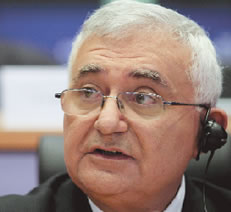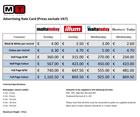
Dalli to ‘keep listening’ from Brussels In an interview conducted just after his appointment as EU Commissioner, JOHN DALLI tells James Debono that he is not renouncing his membership in the Nationalist Party, in which he intends to remain pro-active to ensure that it continues to respect its principles Are you are calling it a day with local politics, and involvement in the Nationalist Party in particular, now that you have become EU commissioner? Do you intend carrying on as ‘father confessor’ to the backbench from Brussels? Or have you left the backbenchers ‘orphans’ to your advice? Your appointment to the EU Commission, and Louis Galea’s appointment to the Court of Auditors, means that the two other contenders for the Fenech Adami succession are out of the political game, at least for the present; and also that two only remaining politically active veterans from the original 1987 Cabinet will no longer be part of government. What is the political significance of this? The latest decision taken by the government before you leave is that of awarding a substantial compensation to bus owners. People can’t understand why the government is offering a considerable compensation to bus owners while they are feeling the pinch of the crisis themselves. Do you blame them? As from tomorrow you will stop being a Maltese Minister and become a European Commissioner. From what you have seen so far, what is the most striking difference and the most striking similarity between the two roles? You have been part of cabinets presided by Eddie Fenech Adami and Lawrence Gonzi, from what you have seen so far how do they compare with EU commission president Jose Manuel Barroso? The pharmaceutical industry was not keen on Barroso’s decision to include pharmaceuticals in the health portfolio. Why is this so? Your portfolio attracts strong lobbyists from big pharmaceutical and the food industries, as well as a lot concern from civil society. To whom will you lend your ears most? The average Maltese consumer is concerned about medicine prices. Much of this depends on internal factors like Malta’s small market. But as EU Commissioner, what can you do to address the international factors leading to the increase of pharmaceutical prices? In a press briefing when speaking about GMOs, you said: ‘This is not only about what we put on our table. There are issues regarding international relations, food security in the future and given this complexity, the decisions should not be one-sided or taken quickly’. Are you avoiding taking a stand on this controversial issue so as not to alienate anyone? You have expressed strong concerns about plans to allow drug companies to communicate directly with the public by allowing companies, under certain conditions, to publish information on their products in newspapers and magazines. Why are you concerned? As EU commissioner your office will also be monitoring Malta’s adherence to directives on things like food safety and consumer rights. How does it feel being in position to supervise a government of which you formed a part of?
Any comments? |
European Elections special editions 01 June 2009 |
Managing editor Saviour Balzan | Tel. ++356 21382741 | Fax: ++356 21385075 | Email




